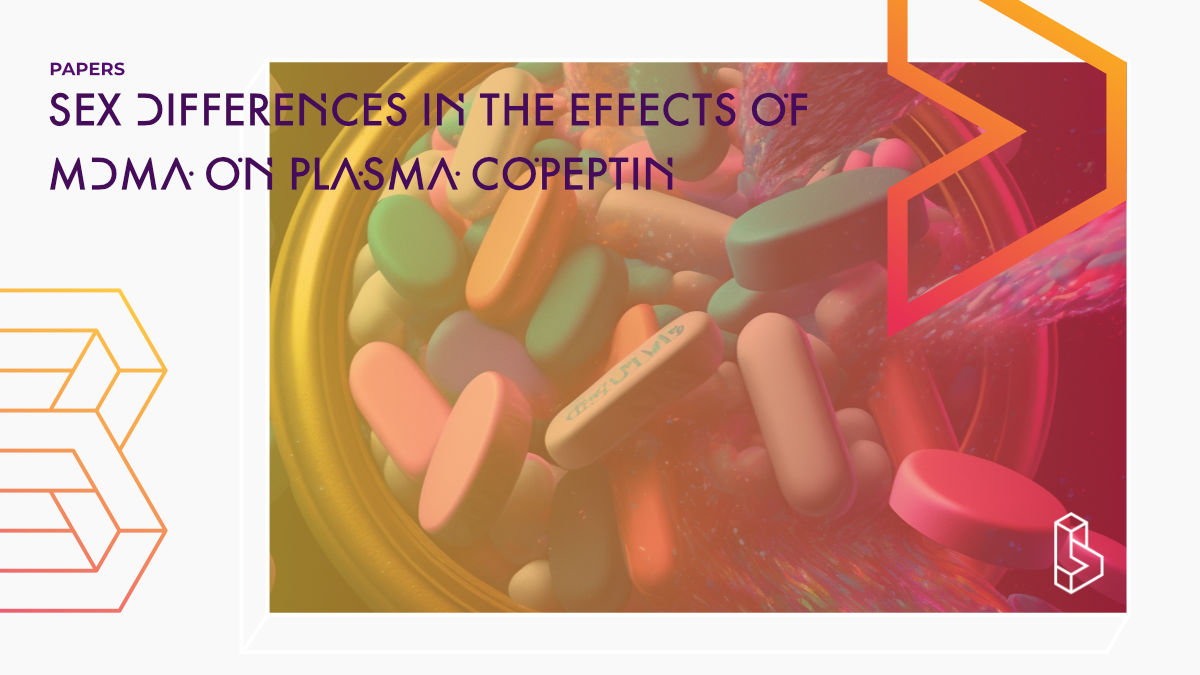This study used a randomized placebo-controlled crossover design to explore the sex differences in increased plasma arginine vasopressin (AVP) secretion following MDMA administration (125mg) in healthy subjects (8 male, 8 female). MDMA significantly elevated plasma copeptin levels at 60 min and at 120 min compared with placebo in women but not in men and MDMA tended to increase urine sodium levels and urine osmolality compared with placebo.
Abstract
“Background: 3,4-Methylenedioxymethamphetamine (MDMA, ecstasy) misuse is associated with hyponatremia, particularly in women. Hyponatremia is possibly due to inappropriate secretion of plasma arginine vasopressin (AVP).
Objective: To assess whether MDMA increases plasma AVP and copeptin in healthy male and female subjects and whether effects depend on MDMA-induced release of serotonin and norepinephrine. Copeptin, the C-terminal part of the AVP precursor preprovasopressin, is cosecreted with AVP and can be determined more reliably.
Methods: We used a randomized placebo-controlled crossover design. Plasma and urine osmolalities as well as AVP and copeptin levels were measured in 16 healthy subjects (eight female, eight male) at baseline and after MDMA (125 mg) administration. In addition, we tested whether effects of MDMA on AVP and copeptin secretion can be prevented by pretreatment with the serotonin and norepinephrine transporter inhibitor duloxetine (120 mg), which blocks MDMA-induced transporter-mediated release of serotonin and norepinephrine.
Results: MDMA significantly elevated plasma copeptin levels at 60 min and at 120 min compared with placebo in women but not in men. The copeptin response to MDMA in women was prevented by duloxetine. MDMA also nonsignificantly increased plasma AVP levels in women, and the effect was prevented by duloxetine. Although subjects drank more water after MDMA compared with placebo administration, MDMA tended to increase urine sodium levels and urine osmolality compared with placebo, indicating increased renal water retention.
Conclusion: MDMA increased plasma copeptin, a marker for AVP secretion, in women but not in men. This sex difference in MDMA-induced AVP secretion may explain why hyponatremia is typically reported in female ecstasy users. The copeptin response to MDMA is likely mediated via MDMA-induced release of serotonin and/or norepinephrine because it was prevented by duloxetine, which blocks the interaction of MDMA with the serotonergic and noradrenergic system.”
Authors: Linda D. Simmler, Cedric M. Hysek & Matthias E. Liechti
Find this paper
Sex differences in the effects of MDMA (ecstasy) on plasma copeptin in healthy subjects
https://doi.org/10.1210/jc.2011-1143
Open Access | Google Scholar | Backup | 🕊
Study details
Compounds studied
MDMA
Topics studied
Neuroscience
Study characteristics
Original
Placebo-Controlled
Double-Blind
Within-Subject
Randomized
Participants
16
Humans
Authors
Authors associated with this publication with profiles on Blossom
Matthias LiechtiMatthias Emanuel Liechti is the research group leader at the Liechti Lab at the University of Basel.
Institutes
Institutes associated with this publication
University of BaselThe University of Basel Department of Biomedicine hosts the Liechti Lab research group, headed by Matthias Liechti.
Compound Details
The psychedelics given at which dose and how many times
MDMA 125 mg | 1xLinked Clinical Trial
Interaction Between Duloxetine and 3,4-Methylenedioxymethamphetamine (MDMA, Ecstasy)The purpose of this study is to determinate the effect of a pre-treatment with the combined serotonin (5-HT) and norepinephrine (NE) transport blocker duloxetine on the pharmacodynamics and pharmacokinetics of 3,4-methylenedioxymethamphetamine (MDMA, "Ecstasy"). The investigators hypothesize that duloxetine will attenuate the subjective and cardiovascular response to MDMA.

